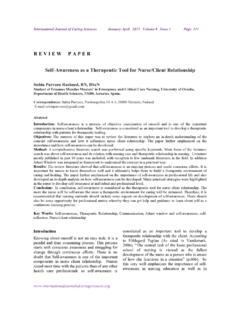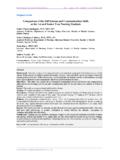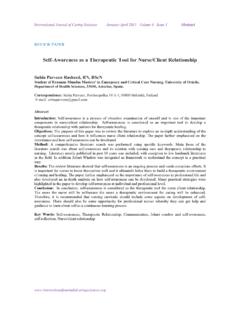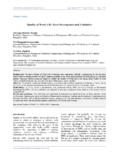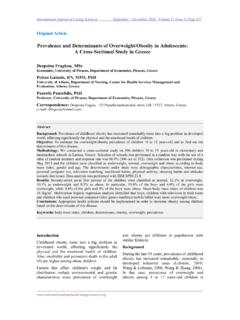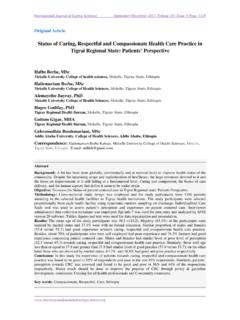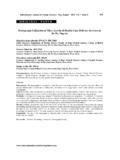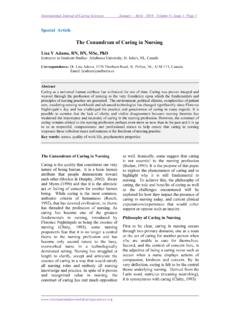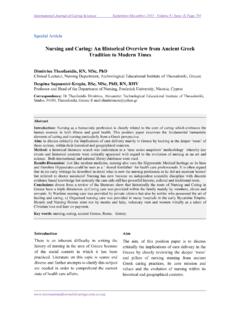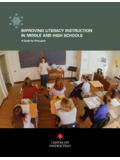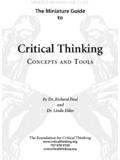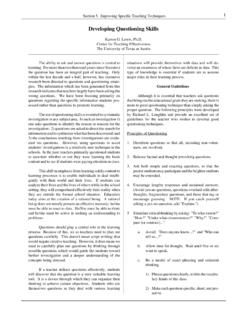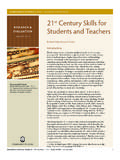Transcription of Critical Thinking and Caring in Nursing Students
1 International Journal of Caring Sciences January April 2017 Volume 10 | Issue 1| Page 471 Original Article Critical Thinking and Caring in Nursing Students Senay Karadag Arli, PhD Assist Prof. Department of Nursing , Agri Ibrahim Cecen University School of Health, Turkey Ayse Berivan Bakan, PhD Assist Prof. Department of Nursing , Agri Ibrahim Cecen University School of Health, Turkey Senay Ozturk, PhD Assist Prof. Department of Nursing , Agri Ibrahim Cecen University School of Health, Turkey Ela Erisik Department of Nursing , Agri Ibrahim Cecen University School of Health, Turkey Zubeyde Yildirim Department of Nursing , Agri Ibrahim Cecen University School of Health, Turkey Corespondence: Assist Prof. Dr. Senay Karadag Arli Department of Nursing , Agri Ibrahim Cecen University School of Health, Turkey email: Abstract Background: The literature shows us the Nursing Students can improve this ability in undergraduate clinical education and they should learn how to think critically for giving better care.
2 Objective: This study identifies the relationship between disposition toward Critical Thinking and Caring behaviour of Nursing Students . Methodology: This cross-sectional study used a convenience sample that comprised 167 undergraduate Nursing Students enrolled in a four-year Nursing course in Eastern Turkey. The data was obtained through a socio-demographic characteristics form, the Caring Nurse Patient Interaction Scale (CNPI-Long Scale) and the California Critical Thinking Disposition Inventory (CCTDI). Results: We determined that there was a positive relationship between overall Critical Thinking dispositions and Caring behaviours (r = , p < ). The simple linear regression analysis result was analysed and it was observed that 22% of the Caring Nurse Patient Interactions were predicted by Critical Thinking disposition (R2 = , p < ).
3 Conclusions: The findings indicate that Caring behaviours relate to Critical Thinking suggest Critical Thinking which promote the development of the intellectual capacities of student nurses as independent Critical thinkers so that Critical Thinking should be in all Nursing curriculum. Therefore, quality client care will be better. Keywords: Critical Thinking Disposition, Caring Behaviour, Nursing Students Introduction Critical Thinking skills are now an expected outcome of Nursing education programmes. The American Association of Colleges of Nursing (1998), the National League for Nursing (1992), and the National League for Nursing Accrediting Commission (2002) identified Critical Thinking as an essential component of baccalaureate Nursing education. Schools of Nursing are required to produce outcome assessments of Students competence in Critical Thinking as accreditation criteria.
4 As Nursing is a practice profession, it is important for the faculty to know the cognitive process characteristics of expert nurses, lead by example and impart Critical Thinking in clinical settings. The current healthcare environment reflects societal patterns of constant change and complexity. The rapid growth of knowledge and technology related to health and illness requires nurses who are able to solve problems and make crucial decisions in clinical situations. Nurse educators must address the challenge of preparing nurses who can think critically (Twibell et al., 2005). International Journal of Caring Sciences January April 2017 Volume 10 | Issue 1| Page 472 Background Nursing is an aid-oriented profession and its main role is Caring .
5 Nursing is a profession that requires complex behavioural practices. The responsibilities of practitioners include physical, psychological, mental and spiritual care for a variety of clients. A nurse affects the patient and is affected them through positive communication and planned Nursing initiatives (Tutuk et al., 2002; Ozcan, 2006). Watson (2005) advocated patient nurse interaction-based Nursing care, and developed Caring Theory from a humanistic and holistic point of view. It is essential to improve knowledge regarding Caring , which is the basis for Nursing (Watson, 1990; Ozer et al., 2006; Yurtsever and Altiok, 2006; Yildirim and Tasci 2013). According to Watson, a nurse must develop and sustain a helping trusting, authentic Caring relationship with their patient in order to promote healing and health.
6 Moreover, in Watson s theory, the nurse patient Caring relationship protects, enhances and preserves the patient s dignity, humanity and wholeness. Therefore, Watson s theory focusing mainly on the nurse patient relationship as a variable central to Nursing serves as a guide for developing a scale that captures the core of Nursing practice. Watson suggests ten carative factors for nurses engaging in Caring . The guidelines do not attempt to describe specific clinical activities, but simply highlight essential elements at the core of Caring Nursing practice. They identify the elements of humanism in Nursing care in therapeutic relationships and clinical activities. The ten carative factors are as follows: (1) humanistic altruistic value system; (2) faith hope; (3) sensitivity to self and others; (4) helping trusting, human care relationship; (5) expressing positive and negative feelings; (6) creative problem-solving Caring processes; (7)transpersonal teaching learning; (8) supportive, protective and/or corrective mental, physical, societal and spiritual environment; (9) human needs assistance; and (10) existential phenomenological spiritual forces (Watson, 1988; Cossette et al.)
7 , 2005). It is well-known that occupational knowledge, experience, Critical Thinking skills and Critical Thinking processes are very important in the Nursing profession. That is why, while managing the Caring process, nurses are obliged to assess the problems of the patient and decide on the method of Caring according to the data obtained. Most of the time, nurses must assess a number of options concurrently and make quick decisions. Sometimes the right decision made by the nurse plays a vital role in a patient s life. This is why Critical Thinking is crucial in Nursing (Ozdelikara et al., 2012). In this modern healthcare environment, with its complex technology and patient interventions, nurses require Critical Thinking skills. Therefore, many studies have emphasised the need for Critical Thinking (Cho, 2005; Zygmont and Schaefer, 2006; Hoffman, 2008; Vacek, 2009; Wood and Toronto, 2012).
8 Critical Thinking ensures that the nurse reflects the basic Nursing training they have received, their occupational experiences and research results which they had assessed logically, when Caring for patients. A lack of Critical Thinking skills can negatively affect the quality, sufficiency and efficiency of service and the professionalism, autonomy and authority in profession. The more effective the nurses are in Critical Thinking , the better their services become in increasing quality of life and protecting and improving public health. That is why it is highly important to provide Students with an insight into Critical Thinking (Ozturk and Ulusoy, 2008). Consequently, Nursing can be defined as the science and art of Caring , whereas Caring can be defined as an interpersonal process/interaction.
9 Moreover, in this modern healthcare environment with its complex technology and patient interventions nurses require Critical Thinking skills. Therefore, many studies have emphasised the need for Critical Thinking ; however, there is a gap in our understanding of the dimensions of Critical Thinking as related to certain behaviours, especially Caring , which is the core of Nursing . This study thus analyses the relationship between Critical Thinking disposition and Caring behaviour of Nursing Students , and it sought to answer the following question: What is the relationship between Caring behaviour and disposition toward Critical Thinking ? Methods Design This study was a cross-sectional study. Participants and sampling methods The participants were a convenience sample of Nursing Students from a four-year Nursing course International Journal of Caring Sciences January April 2017 Volume 10 | Issue 1| Page 473 in Eastern Turkey.
10 The final sample comprised 167 Nursing Students (95 males and 72 females). The sample age range was from 18 to 28 years (M = ). The participants of the research were in the first, third and fourth years of the Nursing Department of the Health School: we had no second-year Students because the university did not admit any Students for one year because of a shortage of lecturers. Moreover, all the Students were practicing in clinics from their first year so had clinical experience. All participants reported having no education on Critical Thinking . Data collection Data collection for this study took place at a university in Turkey. The data was collected between May and June of 2015. A convenience sample of Nursing Students was invited to participate in the study to be held in a classroom, and the Students were asked to sign on a consent form.
